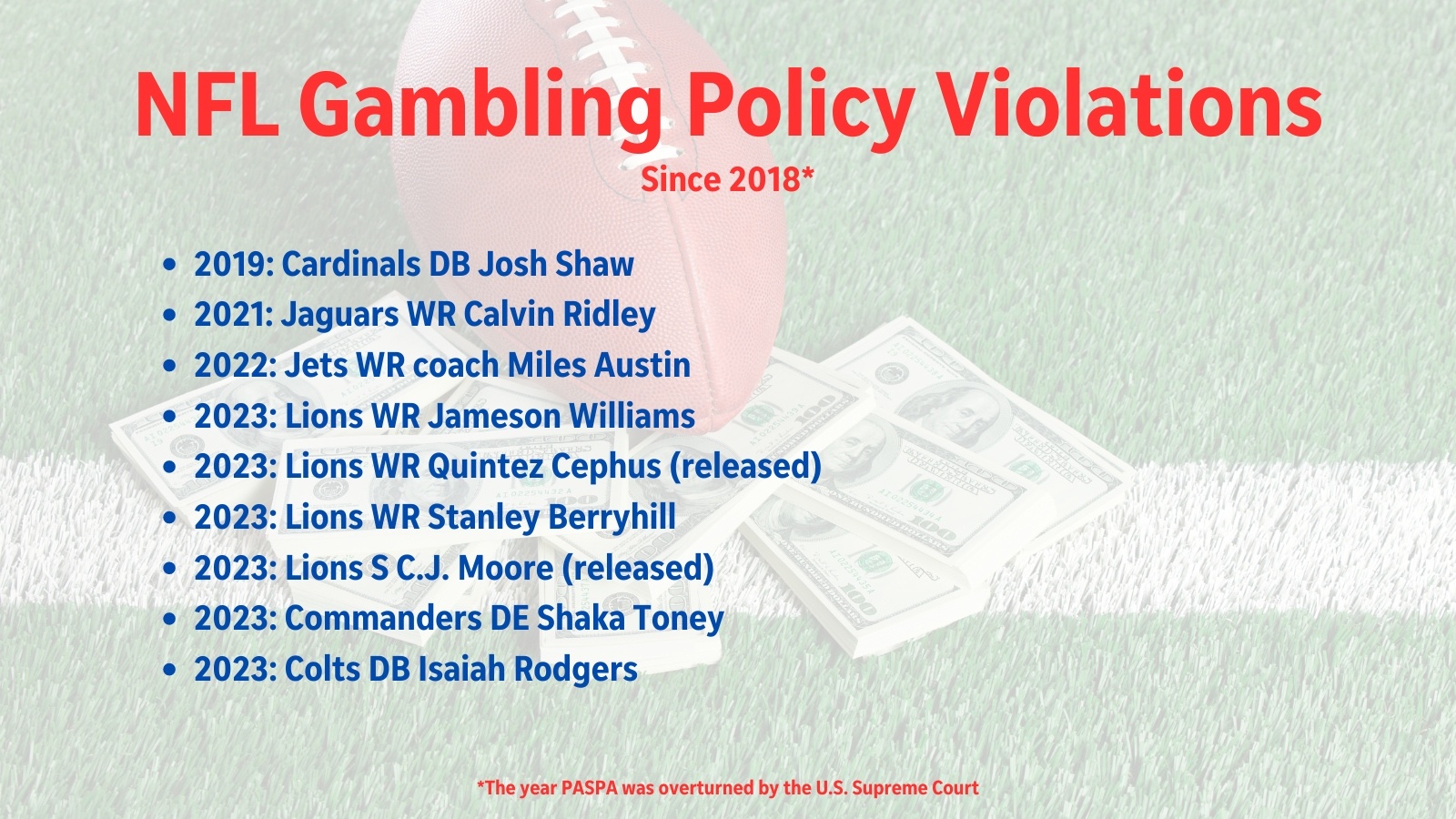Opinion: Colts' Rodgers Latest Example of NFL's Gambling Policy Failures

The NFL has a gambling problem.
The NFL and NFLPA have a simple choice: Make it 100% clear what is allowed, and what isn’t.
Or ban all betting. Period.
It shouldn’t be too difficult to let players know – in the clearest terms possible – what betting is allowed and where it can be done. Very few outside the gambling industry are aware of the geofencing and location technology being used to ensure only those allowed to bet can do so.
Indianapolis Colts cornerback and kick returner Isaiah Rodgers is the latest player to allegedly run afoul of the NFL’s at-times convoluted policy surrounding legal sports betting.
In Rodgers’ case, he allegedly wagered on games featuring his own team and set up his betting app accounts in the name of someone else.
Even Pop Warner players know that’s a no-no.
Rodgers posted on social media that he wants to "take full responsibility" for his actions. "I know I have made mistakes and I am willing to do whatever it takes to repair the situation," Rodgers wrote.
"The last thing I ever wanted to do was to be a distraction to the Colts organization, my coaches, and my teammates. I've let people down that I care about.
"I made an error in judgment and I am going to work hard to make sure that those mistakes are rectified through this process. It's an honor to play in the NFL and I have never taken that lightly. I am very sorry for all of this.”

While some may use these headlines as a panic button, they are proof that regulated betting works when it comes to ferreting out those who – for whatever reason – should not be betting. Or those who are betting on games that include their own team. That remains a capital offense in any sport.
We don’t know what we don’t know. Have players been betting on unregulated, offshore sites and then switched to legal operators? Or did they begin betting when the practice was legalized in their home state?
RELATED: Lions WR Williams Among 5 Suspended For Violating NFL Gambling Policy
What we do know is that because of the verification tools required by state regulators and used by licensed operators, these alleged illicit wagers have found their way to league officials.
Rodgers would be the sixth NFL player suspended in 2023 for violating the NFL’s gambling rules. Four members of the Detroit Lions and one from the Washington Commanders were suspended in April for placing wagers that went against league rules.
Detroit WR Quintez Cephus and safety C.J. Moore were suspended indefinity for betting on NFL games, as was Washington DE Shaka Toney. Two other Lions wide receivers, Jameson Williams, and Stanley Berryhill were suspended for six games because they placed wagers on non-NFL games from a team facility.
Moore and Berryhill were subsequently waived by the Lions.
Former Falcons WR Calvin Ridley missed the entire 2022 season after his suspension for betting on NFL games in the fall of 2021. Ridley placed his bets while he was on the injured list and away from the team in Florida. They occurred during the state’s brief period of legalized sports betting. Ridley is now with Jacksonville following his reinstatement by Commissioner Rodger Goodell.
The NFL has several sportsbook sponsorship deals. The millions of dollars generated by such deals is included in the revenue formula used to determine the NFL salary cap. Players are making money from gambling, whether they choose to wager or not.
Several players and agents told The Athletic that they were unaware of league rules that prohibited mobile wagering from team facilities. That’s typical of the NFL, which operates with a set of rules and regulations so complex and convoluted it would make the nuclear power industry blush.
The meltdown here is largely a result of the league and the players’ union to fully inform players about the rules of what betting is or isn’t allowed, and where it can and cannot take place.
Here is the rule concerning where NFL players and other team employees can wager:
“NFL Personnel shall not engage in any form of gambling while in any Club or League setting including, without limitation, locker rooms, practice or office facilities, team buses, trains, flights, or hotels, or while traveling on Club or League business. For clarity, playing cards or other casino-type games is permitted as long as nothing of value is wagered.”
That’s not quite as clear as “NEVER BET ON OR AGAINST YOUR OWN TEAM.”
RELATED: Ranking The Top 5 Sports Betting Scandals
No wonder Williams told reporters he was both surprised and confused by his suspension. He did not bet on NFL games. What if you wager while riding in an Uber on your way home from a team flight. Or you wager outside your home but before you get on the plane?
“That’s bogus because straight up, that’s not talked about like that. That could have been any one of us,” one player told The Athletic about the Lions suspensions.
“You could make the argument for everybody, because people are betting during rivalry week — Florida is playing Florida State, Ohio State vs. Michigan — everyone is betting on that. Could all those guys get in trouble?”
The Athletic also quoted one player as saying ““I don’t recall seeing (signs that said) no gambling on team property. … I’m pretty sure a lot of guys have actually broken that rule.”
That hints that players have been betting before the Supreme Court overturned PASPA in 2018, clearing the way for the practice to spread nationwide. These bets could have been among teammates, placed with offshore sites, or with local bookmakers.
Rodgers’ situation appears to be a bit more complex. If anything, he may have known the rules and purposely tried to avoid detection. A source told ESPN that the online betting account used by Rodgers was opened by “an associate,” booked about 100 wagers including those on Colts games, and while most wagers were within $25-$50, one was in the “low four-figure” range.
Rodgers started nine games last season. Given the alleged fact pattern, he will at the very least face an indefinite suspension and could be facing a multi-year ban.
We will likely see more players caught up in these violations because of the lag time between when these bets were placed and the current technology’s ability to inform the league and its partners.
But moving forward, there’s no more excuse for the NFL and NFLPA to make the league’s gambling regulations crystal clear to the players, and for players to follow them.
About the Author

Bill Speros is an award-winning journalist and editor whose career includes stops at USA Today Sports Network / Golfweek, Cox Media, ESPN, Orlando Sentinel and Denver Post.
 Free Sports Bet No Deposit Score $10 No Deposit Bonus From Betr (Mar. 2)
Free Sports Bet No Deposit Score $10 No Deposit Bonus From Betr (Mar. 2)  Rebet Referral Code BOOKIES $100 Sign up Bonus & Rebet Reviews (March 2)
Rebet Referral Code BOOKIES $100 Sign up Bonus & Rebet Reviews (March 2)  Onyx Odds Promo Code BOOKIES Get $100 Bonus For Nuggets-Jazz Free Picks (March 2)
Onyx Odds Promo Code BOOKIES Get $100 Bonus For Nuggets-Jazz Free Picks (March 2)  Kalshi Promo Code BOOKIES: Trade $10, Get $10 Bonus for Nuggets-Jazz NBA Predictions Mar. 2
Kalshi Promo Code BOOKIES: Trade $10, Get $10 Bonus for Nuggets-Jazz NBA Predictions Mar. 2  Bleacher Nation Promo Code BOOK Get $250 Bonus For Nuggets-Jazz Predictions (March 2)
Bleacher Nation Promo Code BOOK Get $250 Bonus For Nuggets-Jazz Predictions (March 2)
Comments